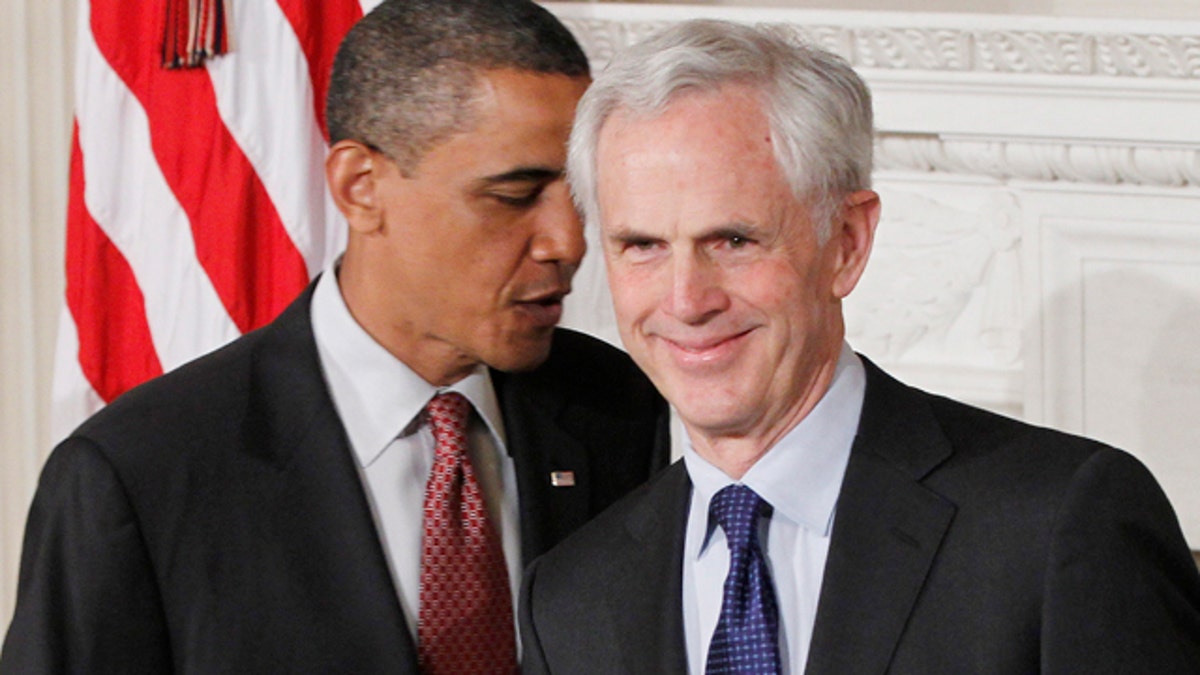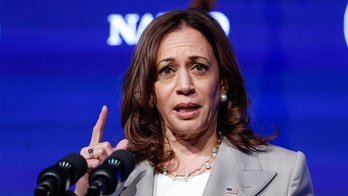
May 31: President Obama stands with John Bryson, his nominee to be the next commerce secretary, in the State Dining Room of the White House. (AP)
President Obama is facing another tough confirmation battle if his pick to replace current Commerce Secretary Gary Locke makes it to the Senate floor.
The president's nominee is John Bryson, who studied at Stanford University and Yale Law School. He is the retired former head of Edison International, the parent company of Southern California Edison, one of the largest electrical companies in the U.S.
But he is, perhaps, best known for co-founding the National Resources Defense Council in the 1970s. The NRDC is a 1.3-million-member worldwide environmental organization that is both respected and feared for its litigiousness and global reach.
Critics say the group has an obvious social agenda. Its mission statement reads in part, "We seek to break down the pattern of disproportionate environmental burdens borne by people of color and others who face social or economic inequities."
While Bryson is praised by the White House as, "an enormously qualified nominee,” his background adds credence to the claim of critics who maintain the Obama administration harbors a redistributive economic agenda.
Bryson admits being a fierce advocate of cap and trade policies. "It has the advantage of politically hiding the fact that you have a tax, but that's what you're trying to do... try to raise prices of carbon,” he said in a speech he delivered at the University of California, Berkeley in 2010. Such policies could be seen as running counter to the NRDC’s mission statement to "break down disproportionate burdens on people of color and others."
"When you seek to raise energy prices by subsidizing renewable technologies, you're going to be hurting those people more than helping them,” Nick Loris, from the conservative Heritage Foundation, said. "Lower income families pay a disproportionately higher percent of their income on energy prices."
Congressional Republicans have chosen unusually harsh language to describe Bryson.
"A green evangelist,” says California Rep. Darrell Issa, chairman of the Oversight and Government Reform Committee.
"The founder of a radical environmental organization," says Oklahoma Sen. James Inhofe, who vows to "work actively to defeat his nomination."
But Bryson may have a bigger obstacle to climb than mere conservative opposition to his environmental record. Forty-four Republican senators have signed a letter to Senate Majority Leader Harry Reid threatening to block Bryson's - or anyone else's - nomination for commerce secretary unless the White House signs an open trade agreement with Columbia, Panama and South Korea. Those pacts, agreed to months ago, have remained unsigned by the president.
Republicans suggest the White House decision not to sign the agreements is at odds with its promise of job creation and open trade.
"One of the reasons why he picked John Bryson is because he feels that he understands and will be able to help the economic team focus on doing things that will continue job growth, continue economic growth, increase our competitiveness, increase our exports, all with the big goal there, which is job growth, " said White House press secretary Jay Carney earlier this week.
Those remarks leave some critics wondering if the Obama administration’s allegiance to unions restricts its commitment to free trade.
Whatever Bryson’s fate, it may be a long time for it is decided. The Senate has scheduled no hearings on his nomination and with Republicans harboring both a will and a way, with 44 votes to block debate on his nomination altogether, there is no urgency for Democrats to do so.




